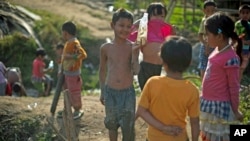BANGKOK —
Burma has agreed to allow the United Nations to deliver humanitarian aid to displaced villagers in rebel-held territory in north Kachin state. The agreement comes two days after progress was reported in peace talks mediated by China, aimed at ending weeks of heavy fighting.
The United Nations office in Rangoon confirmed Wednesday they will soon be able to resume deliveries of aid to Burma's Kachin state, including rebel-controlled areas.
Burma's military and the Kachin Independence Army (KIA) have sporadically clashed since a 17-year ceasefire broke down in 2011. The fighting has displaced more than 80,000 villagers, many of whom are living in makeshift camps and churches and depending on hand-outs.
Burmese authorities allowed humanitarian aid to government-controlled areas, but had put limits on supplies to KIA areas. The last U.N. delivery was in July.
Details to be worked out
U.N. spokesman The United Nations office in Rangoon, Aye Win, says they are still working on the details and logistics, but hope to soon have a delivery date for food and non-food aid.
"These people have not had large-scale assistance for a long time and they are certainly in dire need of it. So, we hope to be able to go in as soon as possible as soon as all the details have been worked out," said Aye Win.
A Burma government spokesman was not immediately available to comment on the agreement for aid to Kachin or any possible timetable.
But, in an earlier interview with VOA, Burma presidential spokesman Ye Htut said the government's reluctance to allow the aid was out of concern for aid worker safety and that supplies could end up in rebel hands.
Renewed fighting complicates relief
Fighting escalated between Burma's military and the KIA in December, with air strikes against rebel posts around Laiza, their headquarters on the border with China.
China expressed concern about the fighting after shelling and protests spilled across the border. Beijing has taken a more open role in hosting peace talks that on Monday resulted in some progress.
Min Zaw Oo with the Myanmar Peace Center attended the negotiations in Ruili, just inside the Chinese border.
"The result is that both sides agree to de-escalate the military tension, especially in the area to stop the fighting from both parties. And, both parties also agree to hold another talk to discuss the detailed arrangement to strengthen the cease-fire from both parties and also to step up to another stage of political dialogue to settle the ethnic conflict," said Min Zaw Oo.
Talks to resume
Burma authorities and the KIA agreed the next round of talks would occur before the end of the month, after consultations with a Burma ethnic alliance, the United Nationalities Federal Council.
The agreement to allow aid into Kachin state comes just days before the U.N. special envoy on human rights is to visit Burma.
Tomas Ojea Quintana will visit Kachin state to assess the impact from the fighting.
He will also visit Burma's western Rakhine state, where communal fighting between Buddhists and Muslims last year left nearly 200 people dead and 100,000 displaced.
The United Nations office in Rangoon confirmed Wednesday they will soon be able to resume deliveries of aid to Burma's Kachin state, including rebel-controlled areas.
Burma's military and the Kachin Independence Army (KIA) have sporadically clashed since a 17-year ceasefire broke down in 2011. The fighting has displaced more than 80,000 villagers, many of whom are living in makeshift camps and churches and depending on hand-outs.
Burmese authorities allowed humanitarian aid to government-controlled areas, but had put limits on supplies to KIA areas. The last U.N. delivery was in July.
Details to be worked out
U.N. spokesman The United Nations office in Rangoon, Aye Win, says they are still working on the details and logistics, but hope to soon have a delivery date for food and non-food aid.
"These people have not had large-scale assistance for a long time and they are certainly in dire need of it. So, we hope to be able to go in as soon as possible as soon as all the details have been worked out," said Aye Win.
A Burma government spokesman was not immediately available to comment on the agreement for aid to Kachin or any possible timetable.
But, in an earlier interview with VOA, Burma presidential spokesman Ye Htut said the government's reluctance to allow the aid was out of concern for aid worker safety and that supplies could end up in rebel hands.
Renewed fighting complicates relief
Fighting escalated between Burma's military and the KIA in December, with air strikes against rebel posts around Laiza, their headquarters on the border with China.
China expressed concern about the fighting after shelling and protests spilled across the border. Beijing has taken a more open role in hosting peace talks that on Monday resulted in some progress.
Min Zaw Oo with the Myanmar Peace Center attended the negotiations in Ruili, just inside the Chinese border.
"The result is that both sides agree to de-escalate the military tension, especially in the area to stop the fighting from both parties. And, both parties also agree to hold another talk to discuss the detailed arrangement to strengthen the cease-fire from both parties and also to step up to another stage of political dialogue to settle the ethnic conflict," said Min Zaw Oo.
Talks to resume
Burma authorities and the KIA agreed the next round of talks would occur before the end of the month, after consultations with a Burma ethnic alliance, the United Nationalities Federal Council.
The agreement to allow aid into Kachin state comes just days before the U.N. special envoy on human rights is to visit Burma.
Tomas Ojea Quintana will visit Kachin state to assess the impact from the fighting.
He will also visit Burma's western Rakhine state, where communal fighting between Buddhists and Muslims last year left nearly 200 people dead and 100,000 displaced.








